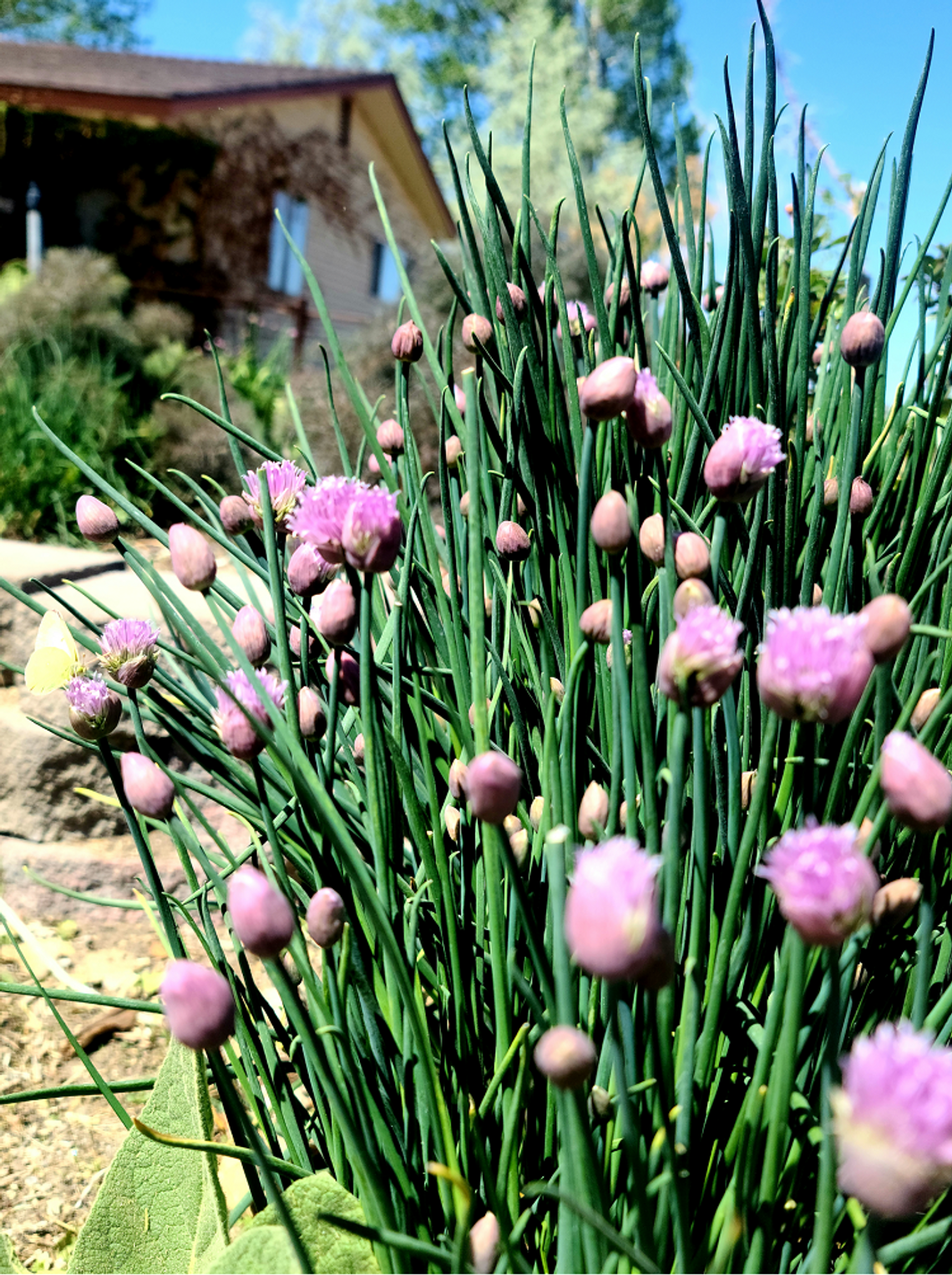By now you might know my fondness for plants that thrive in our challenging growing area. There will always be room in my garden for the useful ones you can divide up and share with friends, the ones that are a cinch to grow and find their place in your garden easily, and especially the ones that my bees love. Common chives fall into this category. They are an often underused and undervalued plant. Chives are so much more than a condiment for baked potatoes, that being said every potato deserves fresh from the garden chives. Herbs, like most vegetables, are exponentially better from your yard than from supermarket shelves. If you are new to herbs, this is a great introductory plant as it is super easy to grow, likes well-drained soil, divides, and reseeds readily. It’s drought tolerant once established but thrives better with regular watering. Be forewarned planting chives can be the gateway to a full herb garden.
Chives are in the Genus Allium which includes leeks, ramps, onions, and garlic. All are part of the flowering plant family Liliaceae. Chives are the smallest, most mildly flavored of the alliums, often used as a garnish or added at the end of cooking recipes because of it. The fines herbes of French cuisine include chives along with tarragon, chervil, and parsley. Fun story, chives were fed to Dutch cows in the 1800s to flavor the milk. Even if you are not a budding epicurean, I would encourage you to consider common chives as a landscape plant. They are beautiful when planted en masse along a border and also great for cottage or rock-type gardens. You can find varieties that bloom in lavender, white, pink, darker purple, and even red. Chives are deer resistant and are good companion plants to carrots and roses as they draw in good garden bugs. At the same time, they repeal carrot flies, aphids, and Japanese beetles. Given the number of aphids, I’m already seeing this year, everyone needs to plant chives.
Allium Schoenoprasum are among the first flowers of spring, a welcomed sight to hungry bees and other pollinators. You can mention they are a monocot to your plant trivia-loving friends. They have one embryonic leaf with grass/bamboo/corn like growth (vs two in dicotyledons). The long hollow shoots grow to about 8-20 inches tall. Chives were used extensively in the Middle Ages. Called fairy music instruments in ancient Europe, used by the Romani for fortune-telling, the Romans for burns and sore throats, and the Chinese for anti-inflammatory properties.
Chives are perennial in our area, growing in dense clumps that can help with erosion. During the long growing season, cut back as much as you need, the plant will regrow and reflower. You can use the shoots immediately or keep them in the fridge for about a week. Alternatively dry or freeze them for winter soups.
Flowers are edible too, they become more pungent in hot weather so now is a perfect time to add the pretty pink flowers to your salad or stir fry. One of my favorite ways to use the flowers is to make a Chive Blossom Vinegar. Makes a pretty gift, and is great in salads, potato salads, marinades, or a Gibson martini. The simple recipe combines a cup of washed, fresh blossoms (not faded pink ones), a 1/4 cup of chopped chive leaves, and a cup and a half of white vinegar in a mason jar. Use a muddler to slightly crush the plant material to release the flavors. Store at room temp out of direct light for about two weeks, you can then strain the contents. You’re left with a beautiful pink elixir to add to homemade salad dressings or potato salads. It should last two months on your counter or six months in your fridge.
If you are a common chive fan, you might also seek out larger, more pungent garlic chives for your garden or Siberian chives. Divide and use them to keep them vigorous. Visit the Green Goddess Seedling Sale and Market on Saturday, May 14th from 10-2 p.m. at the Churchill Arts Council in Oats Park. You’re bound to find locally grown chives and other beautiful plants to add to your garden this year.
Sign up to receive updates and the Friday File email notices.
Support local, independent news – subscribe to The Fallon Post, your non-profit (501c3) online news source for all things Fallon.
The Fallon Post – 2040 Reno Hwy, #385, Fallon, Nevada 89406








Comment
Comments